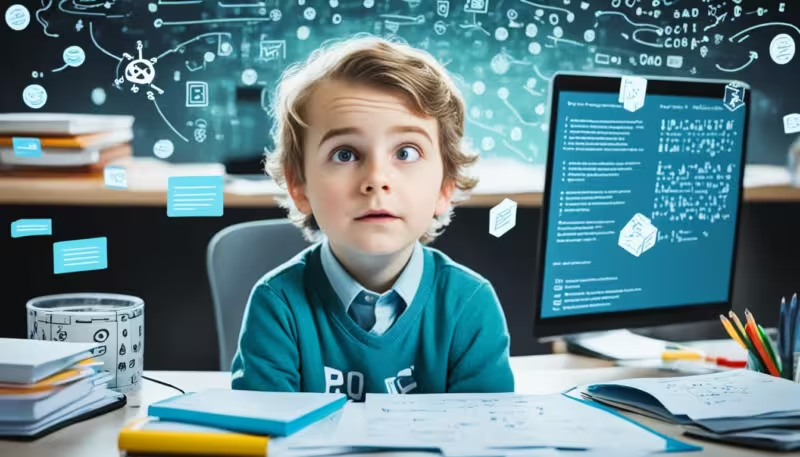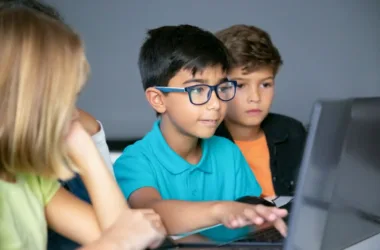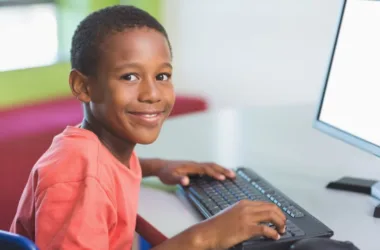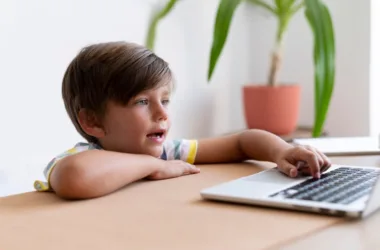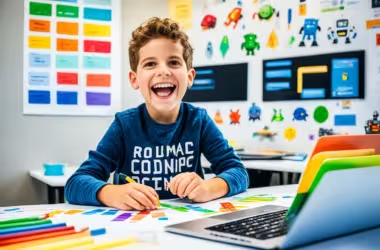Have you thought about how coding changes the way kids think? In today’s tech-savvy world, coding is becoming a crucial skill in education. Now, 45% of high schools offer computer science, a big jump from 25% in 2014. It makes us wonder: Can coding unlock a child’s creativity and make them future innovators?
When kids do coding activities, they learn more than just programming basics. They also gain important skills needed for today’s jobs. Interestingly, over 54% of tech professionals started coding before they turned 16. This shows that starting young can open many doors for them in the future.
This article will show how coding helps kids think critically and solve problems better. These skills are key for success in school and their future careers.
Introduction to Coding as a Critical Skill
In today’s world, learning to code is very important for kids. They grow up in an environment filled with digital tech. Knowing how to code is like learning a new language that helps solve problems. It opens many doors, making it easier for them to keep up with tech changes. This skill helps kids think better and face challenges with confidence.
Coding is also about thinking hard and being creative. Kids learn to take big problems and make them smaller and easier to manage. They come up with new solutions. This not only helps them now but also prepares them for their future. Coding teaches them to follow logical steps and be systematic in solving problems.
Coding does more than just improve tech skills. Studies say it makes thinking skills better too. It sparks creativity, boosts math skills, and improves thinking about thinking. By coding, kids get better at analyzing problems and testing out solutions. This sets them up for success in many areas.
Understanding What Coding Is
Coding is a key skill today, mixing tech with creativity. It’s how we turn ideas into reality using technology. By learning the basics of computer programming, we tell computers what to do. We write commands in a code that computers understand. This involves learning the rules of how to write this code effectively.
The Basics of Computer Programming
To get the hang of basics of computer programming, you start with algorithms. These are steps to solve problems. A solid coding explanation shows how to tackle big issues by breaking them down. This method boosts problem-solving and critical thinking.
By mastering algorithmic thinking, kids learn to approach tasks logically. They tackle problems with structured, step-by-step reasoning.
Different Programming Languages and Their Uses
Different programming languages have specific roles in technology. Each one has special features for various tasks. Python, for instance, is easy and great for starters thanks to its clarity. C++ is used in systems programming for closer hardware management.
JavaScript is vital for web development, crucial for making websites interactive. Knowing these programming languages helps budding coders pick the right tool for their projects.
How Coding Helps Children Develop Critical Thinking
Coding boosts kids’ ability to think critically, a must-have skill today. It teaches them to break big problems into smaller ones. This approach is like the critical thinking we use daily. It helps kids face challenges in an organized way.
Breaking Down Complex Problems into Manageable Parts
Learning to tackle bits of a big problem is key to logical thinking. Through coding, kids learn to simplify tasks. This makes finding mistakes and solutions easier. It helps them in coding and in life situations. For example, debugging teaches them to start solving a problem by finding the exact issue.
Logical Thinking and Its Connection to Coding
Coding is built on logical thinking. It improves children’s problem-solving skills. Kids learn to arrange tasks and define conditions. Coding sharpens their analytical abilities. It helps them understand cause and effect. This boosts their analysis skills for their education and beyond.
Coding Improves Problem-Solving Skills
Coding offers a special chance for kids to improve their problem-solving abilities. By diving into hands-on coding, they face challenges that need creative solutions and careful planning. This direct experience teaches them coding techniques that make hard tasks easier.
Hands-On Learning Through Programming
Kids learn to think critically by doing actual coding projects. They use platforms like LeetCode, with over 1650 practice problems, as great tools. CodeGym also offers more than 1200 tasks, varying in difficulty. This makes hands-on coding fun and engaging. It helps them understand program languages and how to use them to solve problems.
Trial and Error: Learning from Mistakes in Coding
The journey in coding is closely tied to learning from errors. As kids code, they run into bugs and mistakes. This process of trial and error is key for building resilience and flexibility. They get better at solving problems, including thinking about many solutions at once and breaking down big goals. A noteworthy point is that 83% of skilled programmers say solving tough coding problems through practice helped them greatly.
The Role of Creativity in Coding
Coding lets kids show their creativity as they learn. It encourages them to think differently, working on projects they love. This mix of creativity and tech skills makes coding like an art. It opens new paths for innovation.
Encouraging Out-of-the-Box Thinking
Coding makes kids think creatively. Thinking differently is key in coding. It leads kids to find new solutions.
- Interactive games that tell stories
- Animated projects that bring concepts to life
- Innovative applications tailored to solve specific challenges
This creativity in coding sparks curiosity. Kids get better at solving problems and coming up with ideas.
Real-life Applications of Creative Coding
Creativity in coding is useful outside school too. Kids with coding skills can work in many fields. They learn to make tasks easier and solve complex problems.
- Develop software tools for diverse industries
- Leverage emerging technologies like artificial intelligence
- Enhance their problem-solving abilities, making them valuable assets in any job market
Coding helps people innovate and stay current with digital changes. Creativity and coding go hand in hand for success and growth.
Coding and Organizational Skills
Coding is a key tool for improving kids’ coding organization skills. When kids code, they learn to sort and handle information well. It starts with organizing their code. And goes up to making clear coding documentation. This is vital for understanding complicated systems. They get better at managing complex info as they work on different coding tasks.
Learning to code makes kids tackle tough problems. They learn to split big problems into smaller parts. These skills help them manage information better. They can learn, remember, and share ideas more clearly. As the projects get harder, their organizational skills grow. This helps them succeed in school and life.
Coding also teaches kids about teamwork. Working together, they need to explain their ideas well. They need a plan to solve problems together. Sites like Tynker help improve their project skills. So, learning to code helps with coding organization skills. It also gets them ready for many future challenges.
Coding as a Catalyst for Collaboration
Coding is key for teaching kids how to work as a team and communicate. By working on coding projects together, they face real-life situations. This helps them learn to share ideas and responsibilities clearly.
Team Projects and Communication Skills
Kids face challenges in team projects that boost their communication in coding. They exchange ideas and feedback, learning how to share thoughts and listen. This strengthens teamwork, as everyone brings something special to the project. It leads to:
- Stronger teamwork skills.
- Better explanation of technical ideas.
- Improved ability to listen and integrate team ideas.
Handling Conflict During Coding Projects
Conflicts in coding teach kids valuable lessons. They learn to solve problems and negotiate. Managing these situations boosts their skills in dealing with others. Important methods for conflict resolution include:
- Open talks to clear up confusion.
- Trying to understand where others are coming from.
- Keeping team goals in mind to work together better.
Boosting Self-Esteem Through Coding Achievements
Coding is more than learning technical skills. It gives young people a chance to achieve something big. Completing a coding project makes many kids feel proud right away. These coding achievements show their hard work and help build their self-esteem. Seeing their code work boosts their confidence in their own abilities.
Immediate Results from Completing Coding Projects
Kids feel proud when they see their code work. This immediate success boosts their self-confidence. They get quick feedback, which is key for feeling good about themselves. Finishing projects proves their skills and pushes them to try new things. It teaches them about setting and hitting goals, important for boosting self-esteem.
The Importance of Persistence in Learning to Code
The road to coding success has its ups and downs. Facing tough times teaches kids to keep going. They learn that problems are chances to learn, not just failures. This mindset helps them improve and stay strong through tough times. Over time, pushing past these challenges boosts their confidence and sets them up for success in life.
How Coding Supports Academic Achievement
Coding is a key tool in improving students’ academic success. Studies show its benefits, especially in math and logic skills. By tackling coding tasks, students gain a better grasp of complex subjects. This leads to better performance in school.
Enhancing Math and Logic Skills Through Coding
Coding helps kids get better at math. It teaches them to solve big problems by breaking them into smaller parts. This method is similar to solving math problems. Kids pay more attention to details and follow steps in order. Coding helps with:
- Structured thinking: It makes students think in an organized way.
- Analytical skills: It boosts problem-solving skills.
- Debugging capabilities: Kids learn to be patient and keep trying until they succeed.
Research Findings on Coding Integration in Education
Studies on coding show it has a big impact on students. It teaches them to keep trying and learn from mistakes. Coding makes students flexible and improves their thinking. They learn to solve complex problems and spot patterns.
Coding is linked to better thinking skills in kids. As schools include coding, students become smarter. Coding helps in school and in future jobs.
Getting Children Started with Coding
Coding gives kids important skills. They dive into coding resources perfect for their age. These tools boost problem-solving abilities and make learning fun and effective.
Resources for Introducing Coding to Young Learners
Young kids, 4-7 years old, start coding with ScratchJr. It’s a playful way to learn basics like planning and fixing errors. As kids get older, they move to Scratch or Python. These provide deeper learning and projects.
Age-Appropriate Coding Activities
- Robotics Kits: Engaging hands-on kits that allow children to create and program robots.
- Interactive Games: Games designed to teach coding logic while engaging kids in problem-solving.
- Project-Based Learning: Encourage kids to work on small projects that can be completed in a short time, fostering a sense of achievement.
Good coding activities match a child’s age to keep them interested and improve their skills. SkoolOfCode has programs with experienced teachers. This helps kids work on fitting projects that grow coding and problem-solving skills.
Conclusion
Coding is key for teaching kids important skills, like critical thinking. By learning to code, kids not only understand programming. They also get better at solving problems by thinking logically. Coding doesn’t just teach tech skills; it prepares kids for life’s big challenges.
Tools like code.org make learning to code exciting for kids. They offer hands-on experiences that make complex ideas fun to learn. When kids start coding, they learn more than just programming. They develop skills that help them grow in many ways. This shows why coding should be part of school lessons, to get kids ready for the future.
As education changes, families should balance computer time with other learning. Coding is important, but so are traditional skills. By focusing on coding, we give our kids a head start. They won’t just be ready for future jobs. They’ll also be better thinkers and creators in all parts of life.


